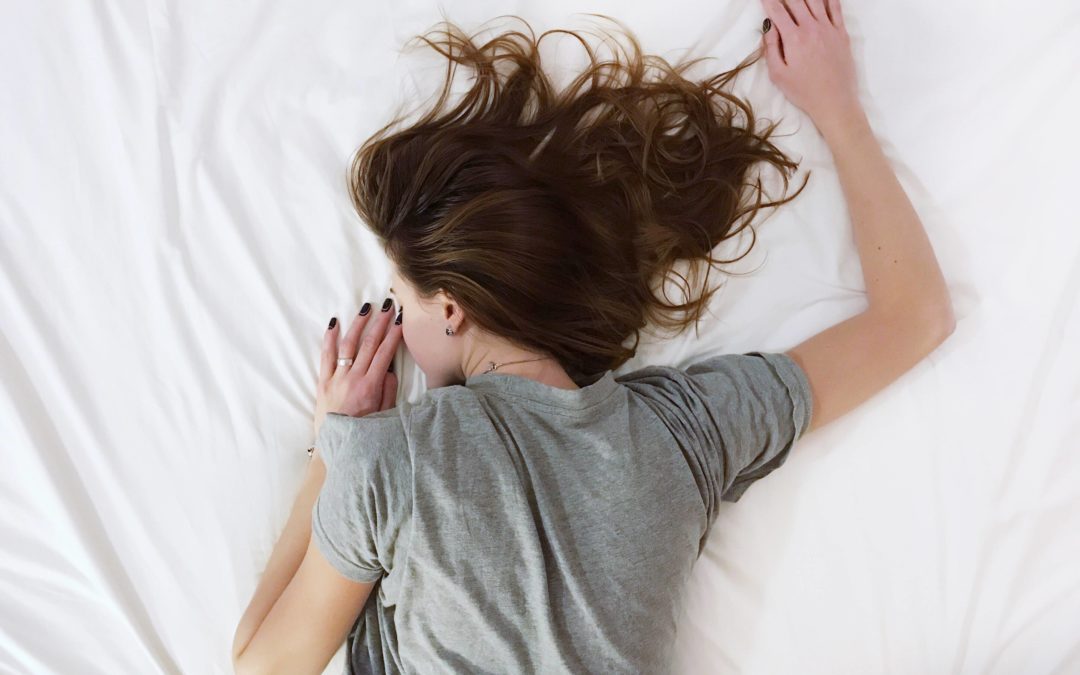- Anti-Racism Tip #8: If It Needs a Disclaimer, Don’t Say It - October 18, 2022
- On Tender Moments that Take Us By Surprise - May 18, 2022
- Finding Creative Ways to Exercise During the Pandemic - April 29, 2022
I have always been a great sleeper. As soon as my head hit the pillow, I would fall asleep and awake in the morning feeling refreshed, rejuvenated and ready to tackle the day.
But since my body crashed, I have struggled to get a good sleep. Some nights I have trouble falling asleep and other nights, I manage to get to sleep but wake up in the middle of the night and lay awake for hours at a time. And worst of all, when I get a poor sleep, I wake up feeling like I’m dragging myself around with a ton of bricks on my feet (at least until I have my morning matcha latte!).
For the last several years, I have been experimenting with various strategies to get back to experiencing a restful, rejuvenating sleep. Now that I have found finally started to get back to better sleep, I wanted to share eight simple strategies in case they might help you get a better sleep too!
8 Simple Strategies to Get a Better Sleep
1. Establish a regular sleep schedule
This is a tip I learned when I was a high performance athlete: our bodies perform best when establish a regular sleep schedule and try to sleep between 8 and 10 hours. So I’m diligent about going to bed by 10 pm every night. I also try to wake up at a consistent time each morning. When I’m feeling fatigued, I wake around 7:30 am (9.5 hours of sleep) and when I’m feeling energetic I wake up at 5:30 am (7.5 hours) and head to the gym before work.
For me, 8-10 hours has always been what I require to function at my best so when I work out a lot I find that I need to take some days off to catch up on my sleep. So knowing how much sleep is ideal for me is an important part of keeping track of what an appropriate sleep schedule is to optimize how I am feeling and my focus.
And although going to bed at 10 pm every night means no television or hanging out late at night with my husband, I realize that I just can’t function if I don’t get enough sleep. As a result, this sleep schedule becomes easier for me to stick with.
2. Eliminate caffeine for a 6-8 hour period before bed
I have a 2 pm rule for consuming caffeine. This means I do my best not to consume coffee, black or green tea after 2 pm. For most people, caffeine has a half life of 5-6 hours but that is for people whose bodies are functioning properly. Because I have been struggling with my sleep for awhile, I err on the side of caution and leave myself an eight hour window before my 10 pm bedtime to be caffeine free.
Sticking to this strategy requires discipline; sometimes, depending on the day, I break down and have a tea after 2 pm. On those days, I often notice that I have more difficulty falling asleep. You may want to test this one out to find what works for you to improve your sleep quality. There are also some studies that indicate certain vitamins may impact sleep quality, including B vitamins and Tyrosine. So if you take supplements, you may also want to do some research about whether they may negatively impact your sleep and experiment with how taking them at different times of day may impact your sleep quality.
3. Minimize blue light exposure before bedtime
Many of us watch television or use our computers and phones right up until we try to fall asleep. Experts recommend spending several hours prior to bedtime not looking at any screens so that our sleep hormone, melatonin, kicks in. As a best practice, that’s ideal. For many people, however, this would interrupt their evening routine so a cheap and easy alternative is to wear blue-light blocking glasses.
A recent study showed that wearing blue-blocking glasses can increase your melatonin production up to 58% so throwing these glasses on (even if they may not be the most stylish option) is well worth it in order to get a better sleep. On the odd night I do watch television, my husband is used to looking over and seeing me looking like this…

But guess what? If there’s any chance it will help me get a better sleep, I’m in.
4. Meditate at night to help you fall asleep
Recently, I have been using a meditation App called Calm.com on my phone. I try to meditate at least once per day and have been working on consistently including this practice in my morning as soon as I wake up. At night, while I’m lying in bed, I also lead myself through a meditation, especially on those nights that I’m having trouble falling asleep.
The meditation I use is from Christine Marie Sheldon (the meditation starts at 31:29) and I really love it because it focuses our attention on our connections with each other and all the planets in our universe. I lead myself through the meditation and visualization that she shares and find it very powerful to guide myself through it. There are also many guided meditations for sleep on calm.com.
I would recommend leading yourself through these meditations so that you memorize them (for those times when you need to us them and don’t have a device) and also so you don’t need a device near your bed that might interrupt your sleep hormones (I discuss this in tip #5).
For those of you who would prefer to use the guided meditation App at night, you’re a perfect candidate to get blue blockers so that you maximize your chances for a good night’s sleep!
5. Place your phone outside the bedroom during the night
Leaving your phone outside the bedroom is a useful practice to help with sleep quality. This ensures that no rings, pings or buzzes from texts or phone calls coming in will jolt you awake in the night. In addition, it reduces your exposure to EMF radiation, which can interfere with all sorts of things, including good quality sleep.
If you use your phone as an alarm to wake up so you want to keep it in your bedroom, be sure to turn it to airplane mode – this turns the transceiver off, eliminates the pings and buzzes that might wake you up, and reduces your overall exposure to EMF radiation. So leave your phone downstairs or in a different room and at the very least put it on airplane mode at nighttime.
6. Wear a sleep mask
I have seen people wearing sleep masks and I always thought it was a bit dramatic. But when I went to see my Alternative MD, Dr. Fred Hui, he told me that he recommends to every single one of his patients that they wear a sleep mask to bed. (So I apologize to all those people I thought were being dramatic!)
Luckily I found a friend who recommended a really good sleep mask, the Bucky 40. The thing I like about this brand of sleep mask is that the parts that cover your eyes are raised so they don’t push down on your eyeballs while you’re trying to sleep. Also, the way it’s designed totally blacks out the room because it seals out the light on every edge.
I have only found two minor downsides to using this sleep mask. The first downside is that in the morning you have no idea what time it is because you don’t have a sense of the amount of light coming into the room. So on many mornings, my children have come into my room to my confused mumbles: “What time is it? Is it morning already?” The second downside is that my kids like to run around the house with it on pretending it is their bra (but it’s actually quite funny!). So if those are the only downsides, I’ll take it!
7. Experiment with a sleep supplement (like melatonin)
Experimenting with sleep supplements should be done under the supervision of a professional, like a naturopath or alternative MD. Under my Alternative MD, Dr. Hui’s supervision, I have found melatonin to be very helpful to support a deeper and more rejuvenating sleep. Dr. Hui recommended that I titrate up the dose of melatonin to find the correct dosage. Once I found the right dosage, I was able to consistently get a better sleep.
I also have tried out some calming supplements before bed, like GABA, Douglas Laboratories Brain Calm and AOR’s ProSleep. Each of these was also helpful at various points for me. So for those of you who are really struggling to get a good sleep experimenting with various supplements, under appropriate supervision, may be a helpful thing to try.
8. Try a weighted blanket
The most expensive addition to my sleep routine is a weighted blanket. A weighted blanket is a blanket that is created to provide weight at a certain percentage of your body weight (this is why it’s important that kids don’t use a blanket weighted for an adult). The idea behind these blankets is that they provide a sensory input while you’re sleeping that calms your nervous system and mind so you can fall asleep faster and stay asleep longer.
A weighted blanket was recommended by a friend who had fallen and sustained a severe concussion and found it helped her nervous system calm down so she could get a better sleep. I have found it really helpful and attribute it, along with all of the above strategies, with a significant improvement in my sleep quality. So for those of you who are desperate to get a better sleep, you may want to give it a try and see if it helps you!
Since my sleep has been interrupted, I have really learned to appreciate the luxury of getting a good night’s sleep. Each of these strategies have helped me improve my sleep and feel more energetic, refreshed, and ready to face the day. I hope that some of these strategies might also help you if you’re struggling to find your way back to that elusive good night’s sleep!
We would love to hear your strategies for getting a good night’s sleep. Post a comment below!
And if you know someone who is struggling to get a better sleep, share this article with them!
If you liked this article, check out:


Recent Comments